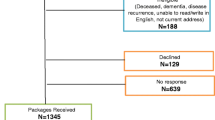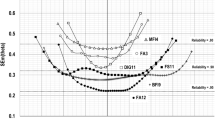Abstract
Goals of work
Fatigue is the most distressing untreated symptom for many cancer patients, and its measurement is of great topical interest. The aim of the present study was to assess psychometric properties of Revised Piper Fatigue Scale (PFS-r) in Italian cancer patients.
Patients and methods
From January to June 2007, 115 histologically confirmed cancer inpatients (age ≥18 years; Eastern Cooperative Oncology Group [ECOG] performance status ≤2), who were undergoing treatments, completed the Italian PFS-r and the Profile Of Mood States (POMS) Fatigue and Vigor subscales. Major psychometric properties were investigated.
Main results
The construct validity of the Italian PFS-r was appropriate, with high corrected item–subscale correlations (Pearson r ≥0.97) for all subscales. Exploratory factor analysis revealed three dimensions instead of four in the US questionnaire; 68.2% of the common variance was explained. Internal consistency was satisfactory (Cronbach’s alpha >0.80) as was the test–retest reliability. Good correlations between PFS-r subscale and POMS subscales confirmed criterion validity.
Conclusions
The psychometric properties of the Italian version of PFS-r, as evaluated in cancer patients ongoing chemotherapy, were satisfactory. We suggest the possible implementation of the Italian PFS-r in the assessment of fatigue particularly when it has been more fully validated on a wider range of cancer patients.
Similar content being viewed by others
References
Armitage P, Berry G, Matthews JNS (2007) Statistical methods in medical research, 4th edn. Blackwell, Oxford
Baker F, Denniston M, Zabora J, Polland A, Dudley WN (2002) A POMS short form for cancer patients: psychometric and structural evaluation. Psycho-Oncol 11:273–281
Brown P, Clark MM, Atherton P, Huschka M, Sloan JA, Gamble G, Girardi J, Frost MH, Pideman K, Rummans TA (2006) Will improvement in quality of life (QOL) impact fatigue in patients receiving radiation therapy for advanced cancer? Am J Clin Oncol 29:52–58
Cella D, Davies K, Breitbart W, Curt G, Coalition F (2001) Cancer-related fatigue: prevalence of proposed diagnostic criteria in a United States sample of cancer survivors. J Clin Oncol 19:3385–3391
Curt GA (2001) Fatigue in cancer. Brit Med J 322:1560
Dagnelie PC, Pijls-Johannesma MCG, Pijpe A, Boumans BJ, Skrabanja AT, Lambin P, Kempen GI (2006) Psychometric properties of the revised Piper Fatigue Scale in Dutch cancer patients were satisfactory. J Clin Epidem 59:642–649
de Jong N, Candel MJ, Schouten HC, Abu-saad HH, Courtens AM (2004) Prevalence and course of fatigue in breast cancer patients receiving adjuvant chemotherapy. Ann Oncol 15:896–905
Dodd MJ, Miaskowski C, Paul SM (2001) Symptom clusters and their effect on the functional status of patients with cancer. Oncol Nurs Forum 28:465–470
Farnè M, Sebellico A, Gnugnoli D, Corallo A (1991) Profile of moods states. Un questionario per lo studio delle emozioni. Giunti, Firenze
Gledhill JA, Rodary C, Mahé C, Laizet C (2002) Validation française de l’échelle de fatigue révisée de Piper. Rech Soins Infirm Mar:50–65
Guillemin F, Bombardier C, Beaton D (1993) Cross-cultural adaptation of health-related quality of life measures: literature review and proposed guidelines. J Clin Epidemiol 46:1417–1432
McNair DM, Lorr M, Droppleman LF (1992) Profile of mood states manual (rev. ed.). Educational and Industrial Testing Service, San Diego
Meek P, Nail LM, Barsevick A, Schwartz AL, Stephen S, Whitmer K, Beck SL, Jones LS, Walker BL (2000) Psychometric testing of fatigue instruments for use with cancer patients. Nurs Res 49:181–190
Mock V, Atkinson A, Barsevick A, Cella D, Cimrich B, Cleeland C, Donnelly J, Eisenberg MA, Escalante C, Hinds P, Jacobsen PB, Kaldoe P, Knight SJ, Peterman A, Piper BF, Rugo H, Sabbatini P, Stahl C, National Comprehensive Cancer Network (2000) NCCN practice guidelines for cancer-related fatigue. Oncology (Williston Park) 14:151–161
Nail LM (2004) My get up and go got up and went: fatigue in people with cancer. JNCI Monogr 32:72–75
Nunnally JC, Bernstein IR (1994) Psychometric theory, 3rd edn. McGraw-Hill, New York
Oken MM, Creech RH, Tormey DC, Horton J, Davis TE, McFadden ET, Carbone PP (1982) Toxicity and response criteria of the Eastern Cooperative Oncology Group. Am J Clin Oncol 5:649–655
Piper BF, Lindsey AM, Dodd MJ (1987) Fatigue mechanisms in cancer: developing nursing theory. Oncol Nurs Forum 14:17–23
Piper BF, Dibble SL, Dodd MJ, Weiss MC, Slaughter RE, Paul SM (1998) The revised Piper Fatigue Scale: psychometric evaluation in women with breast cancer. Oncol Nurs Forum 25:677–684
Richardson A (1995) Fatigue in cancer patients: a review of the literature. Eur J Cancer Care 4:20–32
Servaes P, Verhagen C, Bleijenberg G (2002) Fatigue in cancer patients during and after treatment: prevalence, correlates and interventions. Eur J Cancer 38:27–43
Shacham S (1983) A shortened version of the Profile of Mood States. J Pers Assess 47:305–306
Winningham ML, Nail LM, Burke MB, Brophy L, Cimprich B, Jones LS, Pickard-Holley S, Rhodes V, St Pierre B, Becck S (1994) Fatigue and the cancer experience: the state of the knowledge. Oncol Nurs Forum 21:23–36
Wu HS, McSweeney M (2001) Measurement of fatigue in people with cancer. Oncol Nurs Forum 28:1371–1384
Conflict of interest statement
Annalisa Giacalone, corresponding author, on behalf of all co-authors, declares not to have any actual or potential conflict of interest including any financial, personal, or other relationships with other people or organizations that could inappropriately influence our work, including employment, consultancies, stock ownership, honoraria, paid expert testimony, patent applications/registrations and grants, and any other funding.
Author information
Authors and Affiliations
Corresponding author
Rights and permissions
About this article
Cite this article
Giacalone, A., Polesel, J., De Paoli, A. et al. Assessing cancer-related fatigue: the psychometric properties of the Revised Piper Fatigue Scale in Italian cancer inpatients. Support Care Cancer 18, 1191–1197 (2010). https://doi.org/10.1007/s00520-009-0741-0
Received:
Accepted:
Published:
Issue Date:
DOI: https://doi.org/10.1007/s00520-009-0741-0




